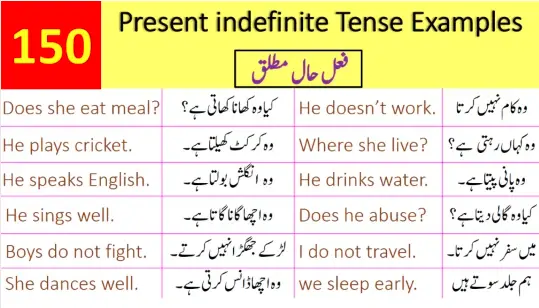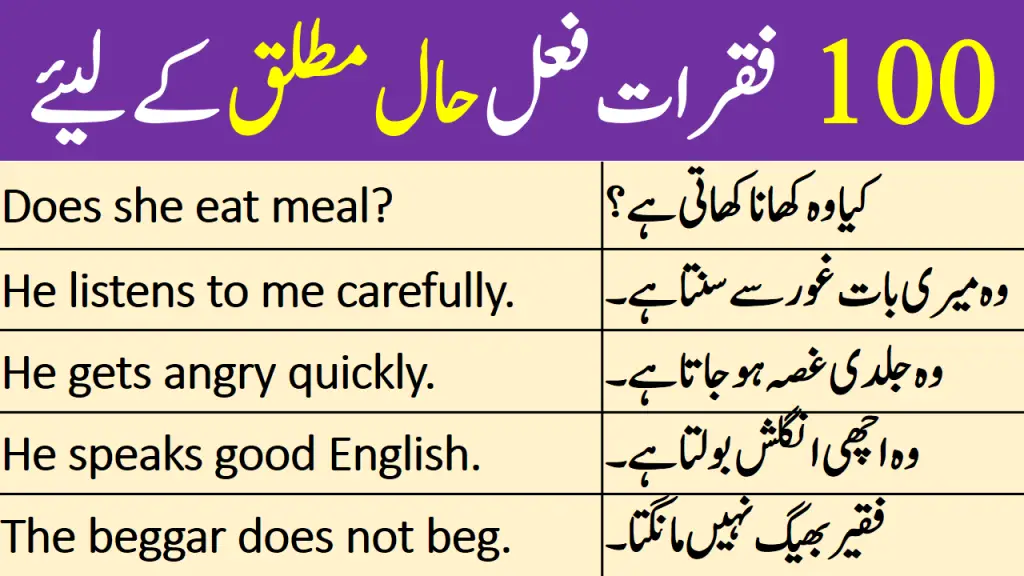Present indefinite tense is one of the three types of simple present tense. It is used to express an action or a state that is incomplete or continues at the time of speaking. It is also used to express an action or a state which began in the past but continues in the present. The indefinite tense is one of three tenses that belong to the present indicative in English. It contains a general state, which usually represents an action (a verb) or a progressive habit that has not come to an end yet (an adjective).
Actions express in present indefinite tense in English are
1. Going to work.
2. Studying for an exam.
3. Running a marathon.
4. Living in India.
5. Watching a movie.
6. Sleeping.
In Urdu, actions express in present

1. What is Present indefinite Tense Examples in Urdu And English?
Present indefinite tense is not just a tense, but actually, a tense group that includes
Present indefinite tense,
This clause is in present indefinite tense, which is the present tense with “be” as its helping verb. The present tense is used to describe things that are happening at the moment of speaking. For example, “I am reading an email.” This tense is also used for future events that will happen in the near future. For example, “I will meet John at 6.”
present indefinite tense examples in Urdu and English,
Past indefinite tense is used with action completed at some unspecified time in the past. To form the past indefinite tense, use the helping verb, WAS, and the past participle of the verb. Following are a few examples of the past indefinite tense.
[wptb id=128]
Future indefinite tense
Future indefinite tense is used to refer to an unspecific or unspecified event that will occur somewhere in the future. Some verbs are used together with a phrase of time which indicates that the event will happen later. It’s important to pinpoint which time frame we’re talking about here. I’ll give you some examples.

2. usages of present indefinite tense
is used to express two types of actions, actions that are going on at the moment and actions that are always being done. Pres. Indef. Tense is used for an action that is continued and will be continued in the future. We don’t use present indefinite tense for completed past actions. It’s always used for unfinished actions.
Examples:
I am learning English.
He is working in a company.
She prefers coffee to tea.
He goes to the library every day.
We come for shopping in this market.
We watch movies in this Cineplex.
3. Definition of present indefinite tense
The present indefinite tense is used to describe an ongoing situation or an action that takes place repeatedly in the present. It is formed using the present tense of the auxiliary verb ‘to be’ (‘am’, ‘is’, ‘are’) and the present participle (-ing form) of the verb.
For example, this is how ‘to be’ is conjugated in the present indefinite tense: Singular: I am We are Plural: You are They are He is, She is, It is The present indefinite tense is used to express the following: -An action that is happening now. -An action that is repeated in the present. -An action that will continue happening in the present. -An action that is going to be happening in the future. For example, I am eating dinner right now. (I am eating dinner right now.) I am always eating dinner. (I am always eating dinner.) I am going to be eating dinner right now. (I am going to be eating dinner right now.) I am eating dinner right now but I am going to have dinner this evening. (I am eating dinner right now but I am going to have dinner this evening.)
4. Examples of present indefinite tense
He is a lawyer.
She is a teacher.
They are doctors.
We are engineers.
You are here.
They are happy.
Use of Present Indefinite Tense:
1. To express habit or repeated action.
2. To express states.
3. To express general truths.
4. To indicate future time.
5. To express customary action.
6. To express purpose.
7. To express results.
8. To express the relation of cause and effect.
9. To express the rate of change.
10. To express time.
11. To indicate the future.
12. To indicate imperative.
Therefore, the Present Indefinite Tense is used to express a variety of actions and states as well as a variety of relationships of actions and states. Present Indefinite is used for habitual actions and for habitual states. It is also used to express general truths, to indicate future time, to express purpose, to express customary action, to express result, to express the relation of cause and effect, to express the rate of change, to express time, and to indicate future. It is also used to express imperative. plus of present indefinite tense.
5. present indefinite tense examples in Urdu and English
is used for describing something that takes place in the present indefinite time. Its usage is not necessary for the time when something takes place. It can also be used for any future event. When we talk about the event which is happening at the time of speaking, we use this tense. It is possible to use verbs in all three person. The tense is used to differentiate between the verbs that are happening at the time of speaking and the verbs which are happening in the present time.
Examples of verbs:
- Mark eats his dinner quickly.
2. We went to the market.
3. You write neatly in your notebook.
4. They thought about all the prizes in the competition.
6. Present Indefinite Tense in Urdu
Present Indefinite Tense in Urdu is used to express an action or state of being which is happening at the time of speaking or at the time of writing. This tense is also known as Present Progressive Tense. Present Indefinite Tense is formed by using subject pronoun + verb in its base form + Object pronoun.
Examples:

7. Present indefinite tense Positive sentences
You can use ‘Pres. Indef. Tense’ to talk about something which is present or happening at the moment, or which is likely to continue to happen.
Example:
He is going to school on a bus.
This is a picture of Jack.
He is playing the piano.
We are walking the dog.
This is a gift for you.
She is going to a shop.
This is a good place.
They are going to play football.
This is a new house.
8. Present indefinite negative sentences
Present negative sentences as if they are negative questions:
He doesn’t play soccer anymore.
She doesn’t like ice cream.
I don’t watch sports.
They don’t like pizza.
We don’t like coffee.
They don’t like chips.
I don’t like beer.
They don’t like coffee.
He doesn’t like coffee.
I don’t like tea.
You don’t like cakes.
They don’t like cakes.
We don’t like cakes.
They don’t like cakes.
You don’t like cakes.
He doesn’t like cakes.
She doesn’t like cakes.
I don’t like cakes.
You don’t like cakes.
We don’t like cakes.
They don’t drink beer.
9. Parts of Sentences
There are two parts of sentences
Subject
A subject is a part of the sentence that contains the person or thing acting in a sentence.
کہتے ہیں۔ Subject کسی فقرے میں جس جس چیز یا شخص کے بارے میں بات کی جا رہی ہو اسے
Examples of Subject
[wptb id=133]
Predicate
Two types of predicate
Object مفعول
The noun object means a thing or things regarded as existing independently of human thought and perception.
For example,
the cat was watching me, the cat is an object because it exists independently of my thoughts and perceptions. An object can also mean a goal or aim. For example, the object of going to college is to get a good education.
I will guide you better with some more Examples
[wptb id=134]
Verb فعل
A verb is a word that represents an action, a state of being, or a thing that has the quality of an action or state of being. Some verbs are action verbs, which means that their meaning is an action. Some verbs are linking verbs, which means that their meaning is more complex. This type of verb is also called a helping verb.
Examples of verb
[wptb id=135]
10. Why should we learn Tenses?
There are many reasons to learn tenses. The most important is that by mastering the tenses, you learn to speak with fluency and precision. If you speak slowly with a lot of pauses in your speech, this will make you sound like an imbecile. This is because you cannot aim your speech if you do not know where you are aiming. And by learning the tenses you also master the timing of your speech. You can also make corrections in your speech by mastering the tenses.
Conclusion
We hope you found this post useful. We are always happy to answer questions about any of our posts anytime at ___. If you would like to read more about the benefits of meditation for anxiety, please visit our website “How to use Meditation to Help with Anxiety” .and you can check also other tens